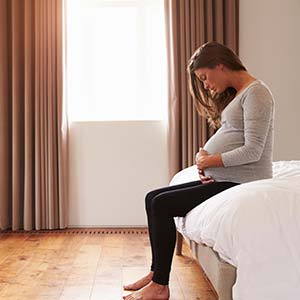According to the National Institute of Mental Health (NIMH), postpartum depression “occurs in nearly 15 percent of births.” Unhealthy thoughts, feelings, and other signs of postpartum depression can interfere with the wonderful bonding process a woman should experience with her newborn. They can negatively affect family life for up to six months after giving birth.
Fortunately, knowing about postpartum depression symptoms ahead of time can help you and your family prepare for potential rough spots after pregnancy.
The signs of postpartum depression
You may have heard the phrase “baby blues." It's an informal term to describe the mild depression or mood swings that occur during the first week or so after birth.
However, postpartum depression is more pronounced than the “baby blues.” According to the Mayo Clinic, “signs and symptoms [of postpartum depression] are more intense and last longer, eventually interfering with your ability to care for your baby and handle other daily tasks.”
Here’s a checklist of postpartum depression symptoms from the NIMH:
- Feeling sad, hopeless, empty, or overwhelmed
- Crying more often than usual or for no apparent reason
- Worrying or feeling overly anxious
- Feeling moody, irritable, or restless
- Oversleeping, or being unable to sleep even when her baby is asleep
Solution #1: Reduce stress
It may be difficult to reduce feelings of stress after bringing your newborn home. What’s more is stress is directly related to depression. Lack of sleep, a monotonous routine, your own or your baby's illnesses, and pressure from loved ones to still perform all the tasks you used to do add up to increase your stress and other signs of postpartum depression.
But it's important to manage your stress during your newborn’s first six months. Before you bring your baby home, ask for help with childcare tasks or make arrangements with friends or a trusted babysitter for one night each week.
Also, try to get away from the house for at least one hour every day, stretching that to several hours at least once a week. Exercise is a great way to spend this time. But you could also try a break with friends, a trip to the library, or just a walk in the park with the dog. You'll come back refreshed and ready for more quality time with your child.
Solution #2: Start an exercise program (even if you’ve never exercised before)
Your body will go through major changes. You'll gain weight and maybe feel physically awkward during and after pregnancy. Many women find that these changes can cause depressive thoughts and other signs of postpartum depression that influence the way they feel about themselves.
Start an exercise program at three days a week for 45 minutes per session, preferably in a group setting. And don’t feel like you have to try high-intensity workouts. Low-impact exercises like yoga or Pilates may be as beneficial for your mental and physical health as aerobics or running on a treadmill.
Also, starting an exercise habit while you're still pregnant has a couple of benefits. You'll have an established routine and a group of friends to help you stay on track. Additionally, exercise increases the feel-good chemicals your brain produces. This makes you feel better naturally, which is enough for many women to avoid the effects of postpartum depression.
Be prepared for the signs of postpartum depression
If you begin feeling down or have other postpartum depression symptoms, talk to a professional. This may include a doctor, a psychiatrist, or a counselor. It's important for your health and for your baby's health to deal with depression both during and after pregnancy.
Exercise at least three days a week and tap into your friends and loved ones for support. If you were successfully treating signs of postpartum depression with prescription antidepressants before you got pregnant, talk it over with your doctor before you stop taking them.
You may need help—be sure to ask for it. You'll feel happier and more bonded with your newborn while getting through those first six months with a more positive outlook.
Read more about postpartum depression, including symptoms and treatments, in the Centers for Disease Control and Prevention’s (CDC) article on maternal depression.




